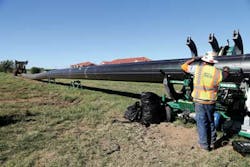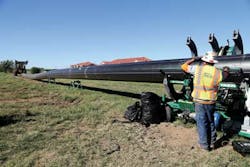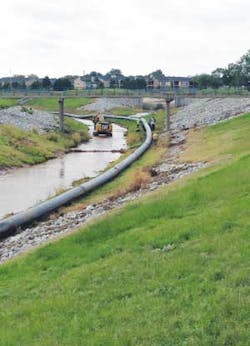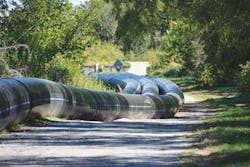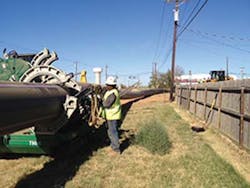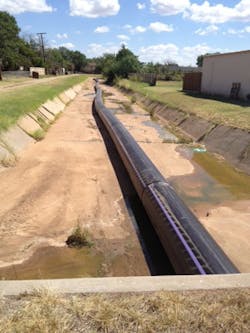No Rain? No Problem: Emergency Water Reuse Pipeline Helps Mitigate Drought-Related Disasters in Wichita Falls
By Melissa Moody
Access to water in the United States is often seen not as a privilege but as a right - one of the inalienable few alongside life, liberty and the pursuit of happiness.
However, water is increasingly hard to come by, especially in Texas. More than 83 percent of the state was in severe (D-3) to exceptional (D-5) drought conditions in 2012, and the city of Wichita Falls in particular has lost 70 percent of its water supply in the past two years.
"It's just disastrous," said Kerry Maroney, a civil engineer with Biggs & Matthews Inc. and a consulting engineer for the city. "In the past 114 years, we've never had two consecutive years of less than 20 inches of rainfall a year; it is unprecedented."
Drought Disaster
Some states worry about sudden tornados appearing with little warning or powerful hurricanes and flash flooding occurring. In Texas, and much of the arid Western United States, drought emergencies may be less volatile but they can still be disastrous.
In 2011, there were more than 100 consecutive days with over 100-degree temperatures and no rain. The combined capacity of the city's water supplies, Lakes Arrowhead and Kickapoo, has dropped 25 percent in the last nine months. As such, the city is not only rapidly losing its ability to provide water to its citizens and industries but also losing its ability to supply wholesale water to surrounding municipalities and utilities that are experiencing similar drought conditions.
With more than 140,000 people affected by the city's drought conditions, residents are restricted to "domestic-only use," which includes necessities like drinking water. Further, all outdoor watering and irrigation are banned, and the surcharge on excess domestic water use has tripled. The city has also issued 2,360 tickets for water violations this year.
"The citizens of Wichita Falls are doing a superior job of conservation - without that we'd be running through 23 million gallons per day, and now, on good days, we're using half that," Maroney said. "But we can't conserve our way out of this."
Wichita Falls first declared stage-one drought conditions in September 2011, which only restricted the city's parks department to twice-weekly watering and initiated a public information campaign to educate residents on water conservation. The situation progressed from there to stage-three in February 2013 when the lake levels fell to 40 percent. Nine months later, the city declared a stage-four drought disaster.
There was no question that Wichita Falls needed to find another way to source water. So they started looking for an answer that didn't come from the clouds. "The bottom line is, we got to a point where we needed to take immediate action," said Shawn Garcia, an engineer with Wichita Falls' Public Works Department.
A Solution from an Unlikely Source
After researching its options, the city came up with an unusual solution - a direct potable water reuse (DPR) project. With water levels dropping and no rain in sight, it was a project that needed to be done, and done quickly. As such, Wichita Falls-based Bowles Construction, the contractor for the water reuse project, hired ISCO Industries to provide a turn-key solution using high-density polyethylene pipe (HDPE).
"ISCO provided Bowles Construction with the full force of our expertise and quality assurance to ensure this project was completed quickly and assure the city it was done correctly," said Steve Garber, ISCO regional sales manager.
The water reuse project will take purified water, created from the 7 to 10 million gallons of treated wastewater normally released into the Wichita River every day, and send it through a 12-mile HDPE pipeline to the Cypress Water Treatment Plant. It will then undergo extensive filtration, reverse osmosis (RO) and clarification, and be mixed with raw surface water. The 50/50 mixture will then endure another treatment process and finally be supplied to the public.
Bowles helped city officials develop the project and determine the route for the pipeline. It also oversaw the project to ensure everything ran smoothly and was completed on time.
"We knew we had to find water somehow; this drought is affecting everybody," said Andy Bowles. "We are a regular utility contractor for the city, and we were happy to bring our knowledge and experience to bear on this situation."
After reviewing both HDPE and fusible PVC pipe for the pipeline, HDPE was the clear choice for the terrain, the variable weather conditions, the flexibility of HDPE material, and the durability of the fusion process. Two weeks after the contract was signed, ISCO delivered the first truckload of pipe. Two days later, field technicians began fusing and laying the 12-mile pipeline for Bowles.
"We have no groundwater source, we continue to see the lakes go down, and we can't jump out there and build a lake," Maroney said. "This project is the quickest way to pick up another 7 to 8 million gallons per day.
"This was an emergency solution, and the rate at which ISCO delivered the HDPE pipe and fused the pipeline together while maintaining quality surpassed my expectations."
About 80 percent of the total withdrawals in the United States are from surface water resources, and the U.S. population generates an estimated 32 billion gallons per day of municipal wastewater. According to the 2012 EPA Guidelines for Water Reuse, arid regions like Texas are natural candidates for water reclamation, and significant projects such as the Wichita Falls water reuse project are already underway throughout much of the region. For Wichita Falls, the temporary reuse project will supply 40 to 50 percent of the water supply.
In less than four months, ISCO supplied 65,000 feet of 32-inch HDPE pipe. The temporary pipeline travels from a wastewater treatment plant on the east side of the city through drainage channels, rights-of-way and ditches to the newly-constructed Cypress Water Treatment Plant on the city's west side. The city will reuse the pipe for a permanent water reuse project to be completed within the next four to five years.
About the Author: Melissa Moody is the public relations coordinator for ISCO Industries. She writes about ISCO's involvement in HDPE projects in a variety of markets ranging from waterworks to nuclear energy.
